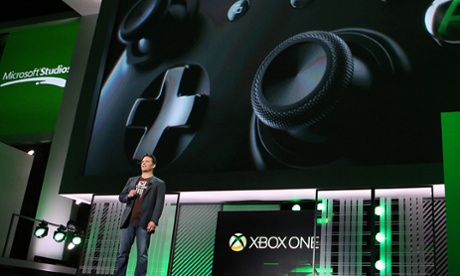
Microsoft has instigated a re-shuffle at the top of its Xbox business, just two months before the games industry's crucial E3 event in Los Angeles. After the departure of chief product officer Marc Whitten in March, Phil Spencer will now be the head of Xbox, overseeing the console itself as well as online infrastructure Xbox Live, Microsoft's game development studios and the on-demand services, Xbox Music and Xbox Video.
Spencer, who was previously head of Microsoft Studios, announced his new role via a blogpost on the Xbox Wire site. Under the headline, "A new day at Xbox", he wrote, "Combining these teams will strengthen the connection between some of the world’s most innovative creators and those building the Xbox itself [...] Games and gamers have always been at the core of Xbox and the core of my work – and gaming will be our core as we take Xbox forward."
Suddenly last summer
The intent of the announcement is clearly timed to sweep away doubts about the positioning of Xbox One in the run-up to what will be a crucial E3 for the console manufacturers. When Microsoft announced its new machine last May, the company mis-stepped by concentrating on the live TV and video capabilities of its hardware – much to the chagrin of its gaming audience.
The PR message was further muddied when Microsoft execs dithered over the exact details of the Xbox One's digital gaming strategy. At first it seemed as though the new machine would require constant connection to the internet and that players wouldn't be able to re-sell old game. However, a series of reversals led to the abandonment of key digital strategies, culminating with the departure of Xbox chief Don Mattrick to Zynga in July.
Since then Microsoft has sought to emphasise the centrality of gaming in its console vision, building its ID@Xbox programme to encourage independent development on the machine. The company also secured much-hyped sci-fi shooter Titanfall as a Microsoft exclusive, keeping it off the rival PlayStation 4 console.
Connected and controlled
So what will this mean to gamers? Firstly, Microsoft is promising a more unified approach to the Xbox business. In part, the problems in May were the result of too many department heads having separate visions of what Xbox One was and little clarity on the ramifications of those visions. Aligning Xbox, Xbox Live and the development studios should lead to better communication and more cogent planning between them.
At the same time, there is clearly a desire to unify Xbox with other Microsoft platforms. In an email sent out to all of the company's employees, CEO Satya Nadella wrote, "Combining all our software, gaming and content assets across the Xbox team under a single leader and aligning with the [Operating Systems Group] team will help ensure we continue to do great work across the Xbox business, and bring more of the magic of Xbox to all form factors, including tablets, PCs and phones."
Xbox owners are already seeing this integrated approach via the SmartGlass app which allows cross-functionality between Xbox games, smartphones and tablets. Meanwhile, Windows 8 provides an array of functions to connect PC and Xbox content, while Windows phone owners can access a mobile version of the Xbox Live service which integrates with the console system. Nadella also praised the console's implementation of cloud computing features, so gamers can perhaps expect more online titles that are seamlessly accessible via console, computer and mobile.
Beyond the aligned messaging, however, what players want to see are new games. PlayStation 4 is so far winning the sales battle against its competitor and to compete, Microsoft must step up on its first-party content. New Halo and Gears of War titles will almost certainly feature at E3, and UK-based studio Lionhead may well make an announcement about a potential new series.
Spencer has promised on Twitter that further new exclusives are in-bound. If he can deliver on this, the "new day" he has promised could be more than just the familiar marketing bluster used to accompany a corporate re-shuffle.
• Xbox One: was Microsoft's reversal the right decision?
• Xbox One – 25 indie games announced

